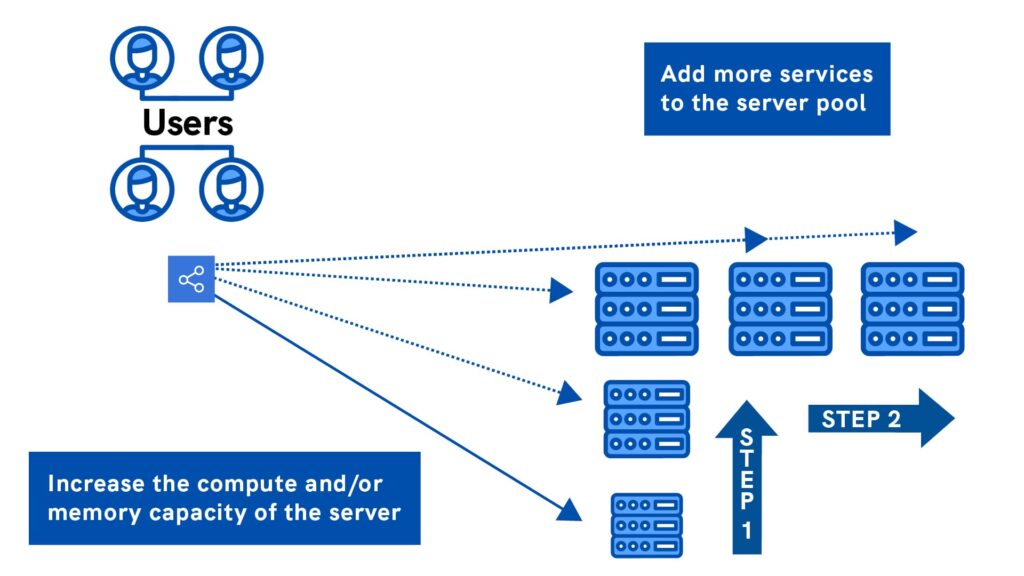What Is Elastic Cloud Storage? A Guide to ECS in 2024

Cloud storage solutions allow businesses worldwide to quickly and easily access their files from any location, which is essential in today’s digitally driven environment. Chances are, you already use one or several of these services within your daily business tasks. Google Drive, Dropbox, and OneDrive are some prime examples of personal cloud storage solutions that you may be familiar with.
However, in a business environment, the requirements for a storage solution are often much more complex and variable. Businesses typically require much more storage space than the average user, but that’s not the only complication that needs to be considered.
In 2024, high levels of availability, security, and efficiency are more crucial than ever for businesses. Companies are often looking for a storage solution that can scale up or down according to their requirements. Many traditional cloud storage plans only offer fixed storage quotas, which might not be sufficient for growing companies.
One solution to this problem is a type of cloud storage solution called Elastic Cloud Storage (ECS). In this blog, we’re going to give you an overview of what Elastic Cloud Storage is, how it works, some of its primary features, and how secure it is.
What is Elastic Cloud Storage (ECS)?
Elastic Cloud Storage, often abbreviated as ECS, is a form of cloud storage that can scale its capacity according to the user’s requirements. In other words, it can increase or reduce the storage capacity whenever required, rather than being fixed to a certain set limit.
As you can imagine, this is invaluable for businesses in countless different ways. Having true flexibility with your cloud storage plan affords you more freedom with your project, website, or application.
Imagine your company has had a stroke of luck and landed a large project. You’ve suddenly found that you need much more storage space than you initially anticipated. Usually, this would require you to contact your hosting provider and wait for the technical team to finish their work. However, with an Elastic Cloud Storage plan, your setup will easily scale up to meet your new requirements without lots of extra hassle.
Conversely, perhaps some of your business endeavors have been unsuccessful, and you find yourself needing to cut back on your expenditures. This might mean that you need to scale down your cloud storage solution, as you no longer require the same capacity as before. Instead of waiting for your contract to run out and changing plans with your hosting provider, you can scale down your Elastic Cloud Storage plan to meet your lower requirements with ease.
These are just some real-world examples to put into perspective just how useful ECS can be for your business, but to get a better picture of exactly what ECS was intended to do, we need to go all the way back to its introduction.
In 2024, the demand for flexible and scalable storage solutions has only increased, making ECS a critical component for businesses of all sizes. This adaptability not only helps in managing sudden changes in storage needs but also ensures cost-efficiency by allowing businesses to pay only for what they use. The ease of scaling up or down without significant downtime or technical complications is what sets ECS apart from traditional storage solutions.
For more in-depth information on cloud storage solutions, you can explore further through trusted sources like TechCrunch and ZDNet, which provide the latest updates and insights into cloud computing technologies.
A Brief History of ECS
Cloud computing as a concept has been around for a long time—since before the internet was even a reality for most of us! However, in practice, cloud computing was implemented in the early 90s, aimed at providing an accessible “public cloud” computing solution.
Early pioneers such as Amazon and Dell soon began to adopt the now commonplace utility-based payment model, where customers benefited from paying only for the utilities or resources they actually used, rather than a set limit they might never reach. This formed the foundation of “elasticity” in cloud computing as we know it today.
Initially, Elastic Cloud Storage solutions struggled to gain traction due to perceived security vulnerabilities and compliance issues, especially in the financial and public sectors. However, as these aspects of cloud computing evolved and improved, public perception changed. Nowadays, this type of cloud solution has been widely adopted across nearly every industry imaginable.
In 2024, ECS continues to be a pivotal technology, empowering businesses to handle fluctuating storage needs efficiently. The advancements in encryption and data protection have addressed earlier security concerns, making ECS a robust and reliable choice for data storage. Today, organizations from healthcare to finance leverage ECS to ensure they can scale their storage dynamically without compromising on security or performance.
For a deeper dive into the evolution of cloud computing and its current trends, consider exploring articles from TechRadar and Forbes Technology Council, which offer comprehensive analyses and expert opinions on the subject.
How Does Elastic Cloud Storage Work?
Elasticity, by definition, means the ability to grow or shrink, and in essence, this is the same in Elastic Cloud Storage (ECS). ECS is a cloud computing infrastructure that can automatically scale up or down dynamically when required, to adapt to any changes in workload. In practice, this means that resource allocations can be increased or decreased to meet your demand.
Some of the most popular methods of implementing this elasticity include horizontal scaling and vertical scaling. Let’s take a closer look at what both of these mean.
Horizontal Scaling (Scaling-Out)
Horizontal scaling, also referred to as ‘scaling-out’, involves expanding the computing infrastructure to handle higher levels of traffic. This means adding more machines to your pool of existing resources, thus increasing the number of nodes that process the traffic and, in turn, allowing each node to process less traffic. This method is particularly effective for distributing web traffic or application data across multiple servers, enhancing redundancy and reliability.
Vertical Scaling (Scaling-Up)
Vertical scaling, also referred to as ‘scaling-up’, involves enhancing the power of your existing system. Instead of adding more machines to your pool of resources (as with horizontal scaling), you add more components like RAM or processors to your existing machine. This method is ideal for upgrading your current system to handle more intensive tasks or larger workloads without needing to distribute the load across multiple servers.
These two types of scaling are geared towards different scenarios. If you’re looking to better distribute your web traffic or application data and handle more of it, horizontal scaling is the way to go. If you want to ‘upgrade’ or add more power to your existing system, then vertical scaling is what you would use.
By leveraging these scaling methods, ECS provides a flexible and efficient way to manage varying workloads, ensuring that businesses can handle peaks in demand without over-provisioning resources, thereby optimizing cost and performance. For more detailed insights on cloud scalability, you can explore resources on AWS Documentation, which offers extensive information on implementing scalable cloud solutions.

Benefits of Elastic Cloud Storage
Instant Scalability
With many hosting providers, it can be a hassle to change your hosting plan to accommodate any changes, and it is rarely instant. An Elastic Cloud Storage solution eliminates this problem by providing immediate scaling of resources to meet any requirements, whatever they might be. If you need more storage space on short notice, this can be easily accommodated. Conversely, if you want to downsize your setup and pay less for a smaller capacity, this is also simple to do.
Prevent Downtime
If your application, website, or platform runs low on resources, you may run into serious issues and even downtime, which nobody wants to experience. Using an Elastic Cloud Storage plan ensures that whatever you’re hosting on your server has the necessary resources to function properly, regardless of any changes. By dynamically scaling resources on the cloud infrastructure, the system ensures that all applications will always have the necessary resources available. In practice, this can save you lots of precious time and money when hosting anything public-facing. If disaster strikes and your website goes down due to lack of storage space, for example, you could potentially lose valuable customers.
Data Redundancy
One perhaps not-so-obvious benefit of using an Elastic Cloud Storage solution is the data redundancy provided, especially when compared to more common forms of storage like local storage. In a cloud storage system, all of your files and data are held off-site. Keeping your data on a cloud storage plan means that your important files are being looked after by industry professionals in a data centre-style environment. Usually, the hosting provider will have methods of storing this data in several different locations simultaneously, rather than in one place. This provides you with a level of data redundancy. If something goes wrong, such as a natural disaster, power outage, or component failure, your important data won’t be lost because it’s being stored in multiple places rather than on a single server. Essentially, your data will be secure and safe from any hardware failures, which would be much more difficult (not to mention more expensive) to achieve with a local storage system.
Increased Security
Keeping your data secure is absolutely paramount, especially in these times when data breaches and malicious cyber-attacks are all too common. Thankfully, cloud storage solutions help to maintain a significantly higher level of security over your information. As we’ve touched on already, data redundancy helps to secure your data against natural disasters or hardware failures. However, having your data held in a secure, offsite data centre also keeps your files safe in a multitude of other ways. All data centres are equipped with physical access control, meaning only a select few authorised staff members are physically able to be in contact with the servers holding the data. Complex firewalls mitigate the risk of compromises or security breaches by blocking unauthorised access at the network level. Regular backups ensure that a copy of your data will always be there, ready to be restored in case of emergency. Strict monitoring ensures the safety of all hosted systems, and regulatory compliance is closely adhered to so that all safeguards meet industry standards.
These are just a handful of the security features provided by a typical data centre environment. For more insights into how Elastic Cloud Storage can benefit your business, you can visit TechTarget for detailed articles and expert opinions..
In Conclusion
Elastic Cloud Storage provides an excellent storage solution to any business with changing requirements, needing a plan capable of adapting to these needs. Along with the massive flexibility afforded by ECS solutions, you can also take advantage of an array of important benefits compared to more traditional methods of storage, such as instant scalability, preventing downtime, data redundancy, and increased security.
At UKHost4u, our mission is to help your business succeed, whatever your goals may be. We provide a variety of hosting plans to suit any scenario, including cloud hosting, database-as-a-service, application-as-a-service, and WordPress cloud hosting. If you’re looking for Elastic Cloud Storage, then look no further. Our Elastic VPS plans offer unbeatable performance and flexibility at affordable prices.
Explore our comprehensive cloud hosting solutions and let us support your business’s growth and technological needs. Visit UKHost4u today to find the perfect hosting plan for your requirements.

